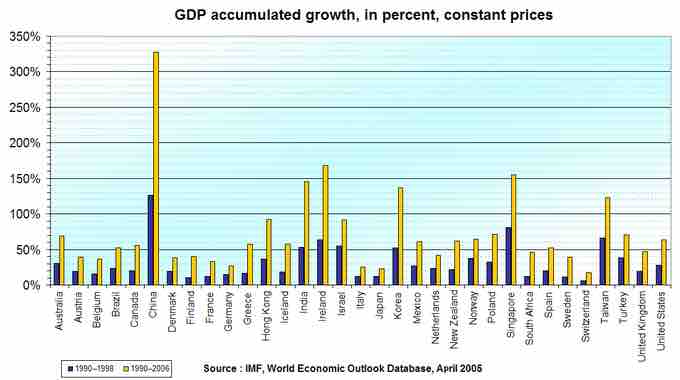Economic Growth
Economic growth is defined as the increase in the market value of the goods and services produced by an economy over time. In order to assess economic growth it must be measured. It is the percentage rate of increase in real gross domestic product (GDP). When looking at the long-term economic growth of a country, it is important to analyze the ratio of the GDP to the population (GDP per capita).
For a developing country to catch up to a developed country, it must not only grow, but grow faster than the developed country. It is possible for such accelerated growth to occur, but there are many country-specific factors that affect a country's ability to catch up to developed countries.
Factors that Impact Economic Growth
There are specific factors that have a direct impact on the economic growth of a country. Every country is unique based on population, technology, government, wealth, etc. Economic growth can be compared between countries, although no two countries are the same. Some of the factors that impact economic growth include:
- Growth of productivity: the growth of productivity is the ratio of economic output to input (capital, labor, energy, materials, and services). When productivity increases the cost of goods decreases causing an increase in the per capita GDP. Lower prices create an increase in higher aggregate demand. The growth of productivity is the driving force behind economic growth.
- Demographics: demographics change the employment to population ratio as well as the labor force participation rate. The age structure of the population affects the labor force participation rate. For example, when women entered the workforce in the U.S. it contributed to economic growth, as did the entrance of the baby boomers into the workforce.
- Labor force participation: the rate of labor force participation impacts economic growth. It is the number of people working in the labor force. When manufacturing increased, it created a higher productivity rate, but lowered the labor force participation, prices fell, and employment shrank.
- Human capital: human capital is referred to as the skills of the population. Education is a commonly used measurement for human capital. Human capital increases the society's skill which increases economic growth.
- Inequality: inequality in wealth and income has a negative impact on economic growth. Inequality results in high and persistent unemployment. This has a negative effect on long-run economic growth.
- Trade: international trade represents a significant part of GDP for most countries. It is the exchange of goods and services across national borders.
- Quality of life: happiness has been shown to increase with a higher GDP per capita. Quality of life is a direct result of economic growth. When poverty is alleviated and society has access to what it needs, the quality of life increases. Consistent quality of life leads to continued economic growth.
- Employment rate: in order for the employment rate to have a positive impact on economic growth there must also be increases in productivity. If employment increases, but productivity does not, then there is a higher number of working poor.
Economic Growth in Developing Countries
The economic growth of any country takes time to develop. Some countries have much larger, stronger, and more developed economies than other countries . The study of the economic aspects of development in low-income countries is called development economics. It focuses on methods for promoting economic development. All of the factors listed previously impact economic growth - most of them positively. It is possible, but not certain that smaller, underdeveloped economies can experience economic growth and catch-up to more prominent economies.

Change in GDP
This graph shows the change in GDP for various countries for the periods of 1990 to 1998 and 1990 to 2006. It is obvious that certain countries have larger and more developed economies than other countries. It is possible for countries with weaker economies to catch up with larger countries, but it is not certain.